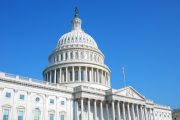
When Sen. Arlen Specter of Pennsylvania announced last year that he was switching from the Republican to the Democratic Party, he said, "My change in party will enable me to get re-elected." But on the eve of Tuesday’s Democratic primary in the Keystone State, it is far from certain that it will even help him get renominated.
Specter has the endorsement of President Obama, the Pennsylvania Governor Ed Rendell (D), and state labor leaders, and he has the financial support of the Democratic Senatorial Campaign Committee. Yet he now finds himself in a race too close to call with Congressman Joe Sestak, who is using Specter’s own words against him.
"Arlen Specter switched parties to save one job — his, not yours," Sestak says in his campaign commercials that also feature clips of then-President George W. Bush praising Specter in his Republican days. Specter, meanwhile, has been running ads showing Obama praising him at a rally last fall for his support of the nearly $800 billion economic stimulus bill.
"I love you and I love Arlen Specter," Obama told the crowd. But not all Democrats share that sentiment. According to a Quinnipiac University Poll conducted last Wednesday through Sunday, Sestak would be the choice of 42 percent of the voters surveyed and Specter 41 percent, with 16 percent undecided. What makes the race especially volatile, however, is the fact that 25 percent of those who expressed a preference said they could change their minds before casting their vote Tuesday. The survey, based on telephone interviews of 951 Pennsylvania Democrats, has a sampling error of 3.5 percent, according to the university’s Polling Institute.
The race is one of three Senate primaries being held on Tuesday, and the outcomes may indicate the extent to which anti-incumbent and anti-establishment sentiment may affect the outcome of the November elections.
In Arkansas, Sen. Blanche Lincoln hopes to fend off a challenge from Lt Gov. Bill Halter in the Democratic primary. Halter, who has described himself as a populist, calls the two-term incumbent a captive of special interests. Halter, who is backed by the AFL-CIO, the Service Employees Union, and the left-wing MoveOn.org, faults Lincoln for, among other things, supporting the bailout of Wall Street banks while working people were losing their jobs. While Republicans and conservative Democrats oppose Lincoln for backing the healthcare legislation Congress passed earlier this year, critics on the Left have faulted her for opposing a single-payer government plan, cap-and trade legislation, and open-ballot voting that unions want as an organizing tool.
While recent polls have shown Halter nine or more points behind Lincoln, he is hoping to at least keep her vote under 50 percent to force a run off between the top two candidates in June. A third candidate in the Democratic race is D.C. Morrison, a former cotton farmer who proposes repealing the new healthcare law, sealing the southern border, and abolishing the income tax and replacing it with a consumption tax.
In Kentucky, there is formally no incumbent in the Republican race to succeed retiring GOP Sen. Jim Bunning, but party leaders have rallied around Secretary of State Trey Grayson. Yet Grayson trails Dr. Rand Paul, 52-34 percent, in a Public Policy Polling Survey released Monday morning. Paul, an ophthalmologist and son of 2008 presidential contender Ron Paul, has the backing of the anti-tax, anti-big government Tea Party movement, which has responded to both his message of less government and more personal liberty and his populist approach.
"There’s a Tea Party tidal wave coming, Paul said. "It’s already hit Utah and it’s coming to Kentucky," he added referring to the recent Republican convention in Utah that denied renomination to three-term incumbent Bob Bennett, mainly over Bennett’s support for the Wall Street bailout.
Former Vice President Dick Cheney, former Republican Senator Rick Santorum, Rudy Giuliani, and the state’s senior Senator, Minority Leader Mitch McConnell, are among the party luminaries backing Grayson. The U.S. Chamber of Commerce has added its endorsement, but the candidate continues to lag in the polls. The winner will face the winner of the Democratic primary Attorney General Jack Conway or Daniel Mongiardo, the lieutenant governor, in the general election. The Republicans expect to win in a state where John McCain won 57 percent of the vote against Barrack Obama, two years ago, but some party leaders claim Grayson would be the stronger candidate in November. Grayson has attacked Paul for opposing federal aid to farmers and for saying that coal is not the best source for energy conversion, a sensitive issue in a state that with a substantial coal industry.
Paul, however, has a strong following among Libertarians and independents, who are not eligible to vote in the closed primary. On Sunday’s Meet the Press program, McConnell was expressing confidence about the fall election with either candidate.
"I think Trey Grayson would be a stronger candidate in November," he said. "But I expect Kentucky is going to be in a pretty Republican mood this fall."
The Pennsylvania race is the only primary in the nation where the Democratic Senatorial Campaign Committee is pouring in money to help the incumbent. But being in a close race for renomination is nothing new to Specter, who was in a similar position as a Republican six years ago, when then-congressman Pat Toomey came close to unseating him. Specter at that time had the support of the Bush White House and GOP leaders from around the country. Rather than face another bruising GOP primary battle with the conservative, pro-life Toomey in 2010, the five-term Senator decided last year he would have a better chance as a Democrat.
A "pro-choice" candidate in a predominantly pro-life party, Specter, 80, had always been unpopular with much of GOP’s conservative base on social issues. He won some favor on the Right, however, by voting against the federal ban on so-called assault weapons. But Specter often split with his party on fiscal issues, most notably early last year, when he was one of only three Republican Senators to vote for Obama’s economic stimulus plan.
"It has become clear to me that the stimulus vote caused a schism which makes our differences irreconcilable," he said of his former party when he announced he was joining the Democrats. But some of his old liberal allies are not with him in his primary battle. NARAL-Pro Choice America, for example, has endorsed Sestak. Specter’s support while a Republican of a partial-birth abortion ban and for the confirmation of Supreme Court Justices John Roberts and Samuel Alito have shown his "pro-choice" position to be inconsistent, said NARAL president Nancy Keenan.
"Pennsylvanians deserve a senator who considers being pro-choice a position of conviction, rather than a position of convenience," said Keenan.
While voters of varied political and ideological persuasions have different reasons for opposing the establishment candidates of the two major parties, many have a common desire to put some new people with different approaches in positions of power in Washington.
"The day of reckoning is coming," said Paul in Kentucky. "We cannot elect the same old politicians without getting the same old mess."
Photo of Sen. Specter: AP Images



